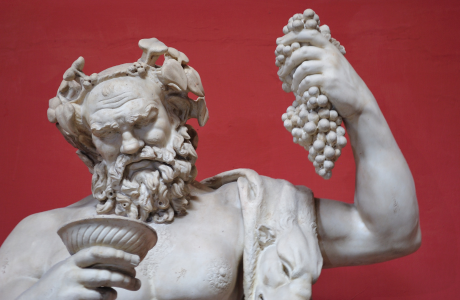This time last year, social media buzzed with numerous posts from Christian people outraged by a scene in the opening ceremony of the Paris Olympics. It wasn’t the whole ceremony—just one part. I blogged about it back then.
Central Figure
The anger was directed at French entertainer Philippe Katerine, who was painted blue, wore budgie smugglers and flowers, and sported a yellow beard. Katerine lay on a giant fruit platter and sang a song. Surrounded by a few others, the tableau was placed on a river barge and floated down the Seine.
However, some viewers and commentators misinterpreted the scene, thinking it was a mockery of Leonardo da Vinci’s painting The Last Supper. This misunderstanding became a classic example of missing the point and sparked outrage.
The Point That Was Missed!
You see, this scene had nothing to do with da Vinci’s painting, or Jesus, or the Christian faith. Katerine’s character was a representation of Dionysus, the Greek god of wine and celebration. It was, after all, the opening ceremony of the Olympics, which originated in Olympia, held in honour of Zeus, about three-quarters of a millennium before Jesus was born.
The ceremony’s artistic director, Thomas Jolly, said, “You will never find in me a desire to mock and denigrate anyone.” Philippe Katerine stated the performance was a message for peace, referencing current wars in places like Gaza and Ukraine. The performance highlighted the idea of harmlessness, as a naked person cannot conceal a weapon. It also connected the origins of the Olympic Games, which depicted naked athletes.
Misunderstood
Have you ever been misunderstood? I have, and it’s not a pleasant experience. You do or say something with genuine motives and an honest heart, only to be entirely caught off guard when you’re misinterpreted and others take offence. You try to justify yourself— “I didn’t mean it that way”—but the more you speak, the deeper you dig yourself into a hole, and you come across as defensive.
The Olympic organisers tried to calm people’s misunderstandings by providing context and even apologising, but the [Christian] people were already fired up and didn’t want to be pacified. Heck, venting on social media is just so much fun.
I invite you to pause, reflect, and ask yourself, “Did our outrage make any difference?” Probably not. Maybe people just saw us, touchy, easily offended Christians, roll their eyes, and step further away.
I’ve watched this sort of behaviour for decades now and long for the days when we grow up and start living in a way that shows the fruit of the Spirit — you know, all that stuff about gentleness, kindness, and the like.
The Way Forward
Before you respond to something that angers you, remember Proverbs 18:13: ‘Spouting off before listening to the facts is both shameful and foolish.‘ The way Christians reacted last year was shameful and foolish—God’s words, not mine. So, before you vent—anywhere—pause, breathe, and ensure you have all the facts.
James 1:19 offers another piece of wisdom: ‘Everyone should be quick to listen, slow to speak and slow to become angry.’ And then there’s Ephesians 4:26, which advises, ‘In your anger do not sin.‘ It’s okay to feel angry, but we must exercise self-control (a fruit of the Spirit) to prevent our anger from turning into sin.
Forgiveness
One of the most gracious voices this time last year was Philippe Katerine himself. There he was in the midst of controversy and angry Christians, and his response? “The most beautiful thing about the Christian faith is forgiveness.”
Even if that scene on the Seine was mocking da Vinci’s painting and Jesus’ Last Supper, where was our Christian forgiveness and grace? Sadly absent. Why is indignation so often our default mechanism when our Saviour taught us to love our enemies and pray for those who persecute us, that we may be children of our Father in heaven?
Respect
Another thing to remember when you’re feeling offended or outraged is to show respect. Think of Paul in Athens, who was deeply distressed to see that the city was full of idols. But when communicating with the locals, he didn’t let his troubled emotions spill over into his words—quite the opposite. Paul praised their religious devotion and referred to their idols as objects of worship. He spoke to them respectfully and used an idol altar as a starting point to share the gospel.
What if we had done that last year? There are numerous connections between the story of Dionysus and the gospel. For example, we could have spoken about Jesus turning water into wine—his first miracle that proved he was God because no person can do that. I know, I’ve been trying for years! Wine also represents Jesus’ blood poured out on the cross for humanity’s forgiveness.
The gospel is the message people need to hear from us, but all they hear is us whinging. It’s interesting to note that Paul wrote a lot about the Olympics (1 Corinthians 9:24-27; 1 Thessalonians 2:19-20; Galatians 5:7; Hebrews 12:1-3). And there wasn’t a hint of outrage in anything Paul taught. Not once did he warn Christians not to attend the games, which were centred around pagan worship of foreign gods. He used the Olympics as an example of discipleship.
Godly Outrage
I am not saying that we Christians should never be outraged. Some things happen in the world that make my blood boil. But I am frequently amazed by the battles we Christians choose. We pick on a blue guy sailing down the Seine, but say little about gross injustice.
What caused Jesus to become angry? It’s an important question because it guides what we should find offensive. For example, Jesus was upset by anyone who harmed children. We should also be outraged by the decades of child abuse in religious and other institutions, along with the cover-ups that followed. It appears that churches and Christians largely remain silent on this matter. Furthermore, Jesus was angry at hypocrisy and at those who exclude vulnerable or marginalised individuals.
Let’s work on understanding the root causes of our outrage and focus our energy on issues that truly matter. Let the world hear about God’s amazing love and grace as shown in Jesus, and make sure nothing distracts from it.















